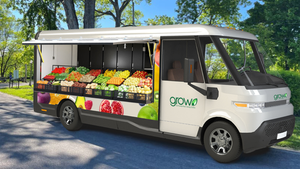Food Waste Consumer Consciousness Is On The Rise
The pandemic has sparked an awareness in consumers about food waste, and many feel that companies should do more to address the issue.
August 11, 2022

Nearly 2.5 billion tons of food go uneaten each year, and conscious consumers are taking notice.
Data results from a recent Capgemini report titled “Why Food Waste Is Everybody’s Problem” show that 72% of consumers have become more conscious about their level of food waste post pandemic. Furthermore, 61% of consumers feel brands, stores and supermarkets should do more to help reduce waste. An overwhelming 91% of consumers said they would prefer to purchase food from companies that are taking steps to reduce waste. Fifty-eight percent said that in the past year, they have increased spending with companies that focus on reducing waste.
WGB spoke to Lindsey Mazza, global retail lead at Capgemini Invent, a global information technology company with more than 40 U.S. locations, recently about food waste, conscious consumers, and how organizations can do more to reduce waste.
Jeniece Drake: I found the sections on consumer awareness of food waste particularly interesting. Could you elaborate more on what consumers are feeling/saying about organizations that take steps to reduce food waste?
Lindsey Mazza: Some of the biggest things that we consider when we talk about food waste, and how do we get to a healthier world — a more sustainable world — is that there’s so much food waste that happens outside the chain. Many of us in our homes feel the tremendous guilt that we have over, you know, I have to throw out this food that I bought. But if we look at the full life cycle, there’s so much waste that happens at the farm. There’s waste that happens within the retails shelfs … a ton of food expiring before it ever reaches the consumer’s home. (There is a) lack of production planning, or lack of understanding of what the demand is going to be.
Why is this such an important issue for consumers, and why is it impacting their decisions on where to shop/who they shop with?
Our research found that 91% of consumers said that they would shop with organizations that were taking actionable steps to reduce food waste. Ninety-one percent is almost inconceivable. You rarely get more that two-thirds of consumers to ever make an agreement that they want to do something. So when 91% of shoppers tell you that they want to reduce food waste, it’s because they believe that that’s the right thing to do.
Sixty-one percent of consumers feel that companies should do more to reduce waste, such as: help consumers understand terms such as "best before," "consume by," and "expiry date" to reduce unnecessary food wastage; as well as provide recipe ideas (on-pack/online) for using excess food. The numbers are showing that companies are saying they are doing these things, but consumers don’t seem impressed. What is your interpretation of this data?
In this post-pandemic world the last two years, we’ve seen the growth of consumers become more conscious about the level of food waste that they have. Shoppers who never considered what was in their refrigerator before spent more time in their homes, and more time really valuing the groceries that they had and making use of those. What does it mean to bring something into my home, and how do I make the best use of that? That was this mass education for people, and I think that that stayed with us. This is a marker on our lives, I think it’s a marker that will stay. We’re now conscientious of it, we’ve had an enlightenment, we’re aware of how we can make a difference.
How can companies reduce costs of food waste?
Really improve their production planning. Get to a better demand understanding of who the consumer is, what they want to buy, and what their price sensitivity and willingness to buy on particular items is. Create an improved production plan that really services the demand for the consumer, and when we’re wrong, open the availability to the consumer and give them the option to use it.
What data from the report were you surprised to learn?
I will tell you, I really was dismayed to see the difference between consumer intent and consumer action. The difference between what a consumer says they want to do, and what action they take. I think our goal as retailers as grocers (should be) supporting consumers in making more choices that align with their intent, which is reduce food waste.
What else would you like to highlight from the report?
The biggest thing that we want to share out there about the report is this is not a doomsday, this is an opportunity. We all have an opportunity to further educate consumers, and to create programs that support consumers.
About the Author
You May Also Like




